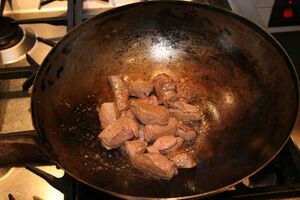Browning

Browning is the process of partially cooking food to give it a brown colour and add flavour. With meats this also helps to remove excess fats. With some foods, such as onions, internal sugars are caramelised on the surface, giving colour and flavour. Ground meat will frequently be browned prior to adding other ingredients and completing the cooking the process. The process is commonly used when adding ground meat to casseroles or other pre packaged meat products.
It is typically done using a frying pan or a wok, which generally should be preheated to avoid sticking. When browning ground beef, the meat is stirred during cooking to break it up and to promote even browning. Onions and seasonings are sometimes added during the browning process. When the pink colour has disappeared and the meat has reached the desired degree of brownness, the pan is removed from the heat and the excess fat is drained off.
The Maillard reaction
The Maillard reaction is a chemical reaction between an amino acid and a reducing sugar, usually requiring heat. Like caramelization, it is a form of non-enzymatic browning. The reactive carbonyl group of the sugar reacts with the nucleophilic amino group of the amino acid, and forms a variety of interesting but poorly characterised molecules responsible for a range of odors and flavours. This process is accelerated in an alkaline environment as the amino groups are deprotonated and hence have an increased nucleophilicity. This reaction is the basis of the flavouring industry, since the type of amino acid determines the resulting flavour.
The Maillard reaction is responsible for many colours and flavours in foods:
- Toasted bread
- Biscuit
- Malted barley as in malt whiskey or beer
- Roasted or seared meat
- Dried or condensed milk
- Roasted coffee
- Dulce de Leche
Find recipes that contain 'Browning'
#browning #dulcedeleche #coffee #beer #roasted #onions #bread #condensedmilk #seared #wok #cookingmethods